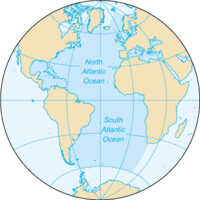
Photo from wikipedia
We investigated the Southern Ocean (SO) prokaryote community structure via zero-radius operational taxonomic unit (zOTU) libraries generated from 16S rRNA gene sequencing of 223 full water column profiles. Samples reveal… Click to show full abstract
We investigated the Southern Ocean (SO) prokaryote community structure via zero-radius operational taxonomic unit (zOTU) libraries generated from 16S rRNA gene sequencing of 223 full water column profiles. Samples reveal the prokaryote diversity trend between discrete water masses across multiple depths and latitudes in Indian (71-99°E, summer) and Pacific (170-174°W, autumn-winter) sectors of the SO. At higher taxonomic levels (phylum-family) we observed water masses to harbour distinct communities across both sectors, but observed sectorial variations at lower taxonomic levels (genus-zOTU) and relative abundance shifts for key taxa such as Flavobacteria, SAR324/Marinimicrobia, Nitrosopumilus and Nitrosopelagicus at both epi- and bathy-abyssopelagic water masses. Common surface bacteria were abundant in several deep-water masses and vice-versa suggesting connectivity between surface and deep-water microbial assemblages. Bacteria from same-sector Antarctic Bottom Water samples showed patchy, high beta-diversity which did not correlate well with measured environmental parameters or geographical distance. Unconventional depth distribution patterns were observed for key archaeal groups: Crenarchaeota was found across all depths in the water column and persistent high relative abundances of common epipelagic archaeon Nitrosopelagicus was observed in deep-water masses. Our findings reveal substantial regional variability of SO prokaryote assemblages that we argue should be considered in wide-scale SO ecosystem microbial modelling. This article is protected by copyright. All rights reserved.
Journal Title: Environmental microbiology
Year Published: 2022
Link to full text (if available)
Share on Social Media: Sign Up to like & get
recommendations!